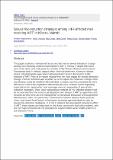| dc.contributor.author | Ragnarsson, Anders | |
| dc.contributor.author | Thorson, Anna | |
| dc.contributor.author | Dover, Paul | |
| dc.contributor.author | Carter, Jane | |
| dc.contributor.author | Ilako, Festus | |
| dc.contributor.author | Indalo, Dorcas | |
| dc.contributor.author | Ekström, Anna Mia | |
| dc.date.accessioned | 2021-09-01T10:37:58Z | |
| dc.date.available | 2021-09-01T10:37:58Z | |
| dc.date.issued | 2/22/2011 | |
| dc.identifier.citation | Anders Ragnarsson, Anna Thorson, Paul Dover, Jane Carter, Festus Ilako, Dorcas Indalo & Anna Mia Ekström (2011) Sexual risk-reduction strategies among HIV-infected men receiving ART in Kibera, Nairobi, AIDS Care, 23:3, 315-321, DOI: 10.1080/09540121.2010.507753 | en_US |
| dc.identifier.other | PMID: 21347894 | |
| dc.identifier.uri | http://repository.amref.org/handle/123456789/201 | |
| dc.description.abstract | This paper explores motivational factors and barriers to sexual behaviour change among men receiving antiretroviral treatment (ART). Twenty in-depth interviews were undertaken with male patients enrolled at the African Medical and Research Foundation clinic in Africa's largest urban informal settlement, Kibera in Nairobi, Kenya. All participants experienced prolonged and severe illness prior to the initiation of ART. Fear of symptom relapse was the main trigger for sexual behaviour change. Partner reduction was reported as a first option for behaviour change since this decision could be made by the individual. Condom use was perceived as more difficult as it had to be negotiated with female partners. Cultural norms regarding expectations for reproduction and marriage were not supportive of sexual risk-reduction strategies. Thus, local sociocultural contexts of HIV-infected people must be incorporated into the contextual adaptation and design of ART programmes and services as they have an over-riding influence on sexual behaviour and programme effectiveness. Also, HIV-prevention interventions need to address both personal, micro- and macro-level factors of behaviour to encourage individuals to take on sexual risk-reduction strategies. In order to achieve the anticipated preventive effect of ART, these issues are important for the donor community and policy-makers, who are the major providers of ART programme support within weak health systems in sub-Saharan Africa. | en_US |
| dc.description.sponsorship | Swedish International Development Agency (Sida)/SAREC (SWE-2006-255) | en_US |
| dc.language.iso | en | en_US |
| dc.publisher | Taylor & Francis | en_US |
| dc.subject | HIV and AIDS | en_US |
| dc.subject | ART and prevention | en_US |
| dc.subject | Gender | en_US |
| dc.subject | Sexual risk reduction | en_US |
| dc.subject | Men | en_US |
| dc.title | Sexual Risk Reduction Strategies Among HIV Infected Men Receiving ART in Kibera, Nairobi | en_US |
| dc.type | Article, Journal | en_US |

